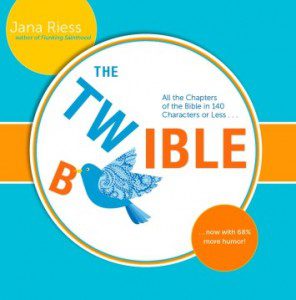Is the Bible a funny book?
Nearly a decade ago, I read David Maine’s winsome and witty novel The Preservationist, an imaginative retelling of Noah and the flood that is simultaneously irreverent and faithful toward the biblical narrative. Maine’s The Fallen, a novel about Adam, Eve, and their expulsion from Eden, proved a splendid follow-up. Lots of sex, crude behavior, and, of course, misbehavior.
Jana Riess’s Twible is more upbeat but just as funny. The book is a compilation of her tweets on all 1,189 chapters of the Bible (and bonus summaries of its 66 books), all “in 140 characters or less but with humorous commentary.”
I greatly admire authors who try to be funny and succeed. Comedy is tough work. One key is to till fertile ground. Bingo — the Bible! A book full of strange and perplexing things done by both human beings and their deity.
Genesis: “In the beginning were some messed-up folks and a God who couldn’t decide whether to love them or kill them. Say amen.”
Genesis 47: “Phar nationalizes land and livestock. He also begins to enslave people, a policy that will bite him in the ass in about 400 years.”
Exodus 17: “You can take the people out of slavery, but you can’t take slavery out of the people.”
Ruth: “Foreign girls wins Israeli edition of The Bachelor.”
The New Testament tweets are not quite so hard-edged.
Mark 12: “JC says it’s kosher to pay taxes to Caesar. This is the IRS’s favorite chapter of the Bible. The rest of us aren’t too thrilled with it.”
Luke 23: “There’s just nothing funny about Jesus dying on a cross. Sorry. Catch up with me in the next chapter.”
Maybe the Twible‘s not for everyone. It’s not the ideal birthday present for my mother. She wouldn’t appreciate the sidebar on “The Top Five Incestuous Relationships in Genesis.” But people who don’t mind a frank examination of the Bible’s weird and violent bits (this isn’t Vacation Bible School) will find Riess’s book both entertaining and beneficial. Furthermore, as Riess points out, while Americans claim that the “Bible has the answers to life’s most important questions, they’re not actually reading it.” Surveys that I do not entirely believe suggest that half of Americans cannot identify even one of the four Gospels. When I was in high school, it was news that hardly anyone could locate the United States on a world map. By the time I’m dead, surveys will show that we all have no appreciable brain activity. Maybe people have been reading so many blog posts by Philip Jenkins on extra-canonical literature that they’ve forgotten which four are the bona fide, council-approved gospels.
In any event, anything that would get people to pay attention to the indisputably fascinating narratives and poetry of the Bible (okay, it gets a bit slow for a while after Exodus, but lots of books slow down after a compelling start only to find their footing by the end) is good news. And even beyond Riess’s humor, the book is also filled with eloquent and thoughtful sidebars — a bit of instruction and inspiration mixed in with the fun.
Back to the opening question. Most people separate religion and humor, especially today. It’s not kosher to make fun of other people’s religious practices or their sacred books. Riess is poking fun at a text that is scripture for her. Regardless, though, her book is a good and healthy reminder that because religion is something that human beings do, it’s often pretty silly and funny.
And God is sometimes pretty funny as well.
Genesis 18: The Negotiator. Ab: “What if 50 righteous are in Sodom?” G: “OK, I won’t torch it if I find 50.” Ab: “45? 40? 30? 10?” G: “OK, OK! Lay off!”












